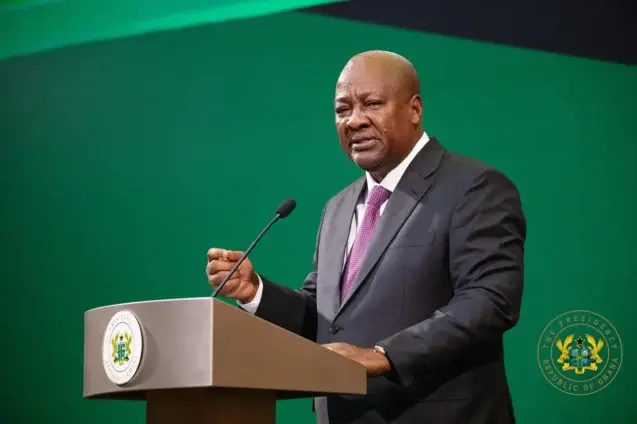Ghana’s economic landscape is showing encouraging signs of macroeconomic stabilization, according to Dr. Johnson Pandit Asiama, Governor of the Bank of Ghana (BoG). In a recent address, Dr. Asiama highlighted the impact of the central bank’s policy actions and improvements in both external and domestic fundamentals. These developments suggest that Ghana is experiencing significant economic gains. The Governor emphasized that the BoG’s strategic interventions have been pivotal in achieving these positive outcomes.
This article breaks down the Governor’s explanation of these economic gains, focusing on key factors such as declining inflation, currency appreciation, and positive assessments from international bodies. We will examine the specific measures taken by the BoG, the influence of global economic factors, and the challenges that still lie ahead, providing a comprehensive overview of Ghana’s economic progress as articulated by its central bank leader.
One of the most significant factors driving Ghana’s economic resurgence is the decline in inflation rates. According to Dr. Asiama, “The decline in inflation to 21.2 per cent last month had been shaped by a combination of monetary tightening, relative exchange rate stability, and easing of non-food inflation.”
The BoG’s decision to raise the policy rate, a form of monetary tightening, played a crucial role. This move aimed to curb excessive spending and reduce demand-pull inflation. Furthermore, a stable exchange rate has also contributed significantly by reducing the cost of imported goods and services, thereby easing inflationary pressures. The easing of non-food inflation, influenced by various factors, also added to the overall decline in the inflation rate.

Another key element in Ghana’s recent economic gains is the appreciation of the Ghana Cedi. Dr. Asiama noted, “…the cedi has appreciated by nearly 19 per cent between April and May, helping to ease imported inflation pressures and restoring public confidence.”
Prudent monetary policy has been instrumental in strengthening the currency. Improved market sentiments, driven by increased investor confidence in Ghana’s economic outlook, have also bolstered the cedi’s performance. Gains in the external sector, resulting from increased exports and favorable international trade dynamics, have further contributed to the cedi’s appreciation. The cedi strengthened from GH¢15.53 to GH¢13.09 per dollar between March 12 and May 12, 2025, marking a substantial recovery.
| Currency | March 12, 2025 | May 12, 2025 |
|---|---|---|
| USD | GH¢15.53 | GH¢13.09 |
| GBP | GH¢19.41 | GH¢16.36 |
| EUR | GH¢16.87 | GH¢14.21 |
International assessments and agreements have also played a pivotal role in affirming Ghana’s economic gains. Dr. Asiama highlighted the country’s progress with the International Monetary Fund (IMF) and S&P Global Ratings.
“…the country had reached a staff-level agreement with the International Monetary Fund (IMF) on the fourth review of the Extended Credit Facility (ECF) programme…” This agreement is significant as it indicates that Ghana has met key performance indicators under the ECF program, reflecting a positive trajectory in its economic reforms. These prior actions have paved the way for continued support from the IMF.
Furthermore, “…the recent S&P Global Ratings upgrade of Ghana’s sovereign rating from selective default to CCC+ further affirmed the progress that had been made so far in managing the economy.” This ratings upgrade is crucial for boosting investor confidence and attracting foreign investment. It signifies that Ghana has made substantial strides in managing its economy, leading to a more favorable assessment by international credit rating agencies.
Challenges and Future Outlook
Despite these positive developments, Dr. Asiama cautioned that challenges remain. “Although there had been stabilisation in macroeconomic conditions, the path ahead remained complex and fraught with risks, both global and domestic.”
The potential second-round effects of inflation, stemming from food supply constraints and external price shocks, pose a significant risk. Geopolitical tensions and evolving global trade dynamics could also influence Ghana’s economic stability. In light of these challenges, the central bank has commenced a comprehensive review of its monetary policy implementation framework.
Dr. Asiama explained, “…the central bank had commenced a comprehensive review of its monetary policy implementation framework…” This transition involves shifting from a cash reserve ratio to active open market operations, with the objectives of enhancing policy transmission, improving liquidity management, and facilitating credit expansion. These measures are aimed at ensuring sustained economic gains and stability.
In conclusion, Dr. Asiama’s insights shed light on the economic gains Ghana has experienced, driven by strategic policy implementations and favorable global conditions. While positive strides have been made in curbing inflation and stabilizing the cedi, the Governor emphasized the need for continued vigilance in navigating both domestic and global economic uncertainties. The comprehensive review of monetary policy signals a commitment to sustained economic progress, but the path forward requires careful management and decisive action to consolidate these economic gains and foster long-term stability.
Image Source: MYJOYONLINE





















